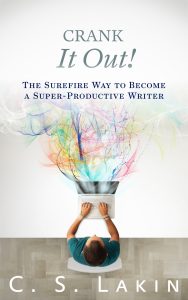10 Time Management Tips for Fiction Writers
Today’s guest post is by Juliet Dreamhunter.
Let’s be real: there’s a tiny black hole in the bottom drawer of your writing desk, isn’t there? One that greedily devours minutes and hours while you wrestle with a plot twist or a stubborn character refusing to cooperate.
Fiction writing is no walk in the park—it’s a labyrinth of creativity and practicality, where every corner turned has you running into a wall of time constraints.
The world doesn’t pause for you to breathe life into your stories: the dishes need washing, the bills require paying, and the inbox awaits your attention.
What if you could navigate this labyrinth more effectively?
In this article, I’ll share 10 time management tips I learned over the years as a certified goal success coach. They will help you make the writing process less frustrating so you can write that masterpiece while still enjoying your life!
1. Set tiny daily goals
Staring at a mountainous task (like writing a whole novel) feels daunting, doesn’t it? It’s like staring up at Everest, feeling the cold, thin air stealing away your breath. No wonder it’s one of the most common causes of procrastination!
But what if you broke that mountain into a bunch of easy-to-climb hills? You can do this by setting tiny achievable writing goals for every day that don’t put your brain into panic mode.
Instead of setting a goal as “I need to write a novel,” or even approaching a whole chapter, think, “Today, I will write 500 words.”
If even that sounds difficult, you can start with “I just need to write 5 sentences” and see where it takes you. Oftentimes, starting is the toughest part because of all the pressure you put on yourself, but once you get in the flow, you’ll likely end up with more than 5 sentences.
2. Identify your most productive time
If you haven’t heard of biological prime time, it’s that golden window of the day when your energy levels are at their peak. You’re not wrestling with fatigue or distraction; it’s just you and your story, cruising down the highway of creativity.
Pay attention to when you’re most alert, energized, and don’t tend to distract yourself with random tasks. Once you’ve identified this magical time, reserve it for your writing and say no to everything else!
While many people are more productive in the morning, my best time is right after lunch. I call it “my creative time” and block those few hours in my calendar for focused writing.
3. Work in Pomodoro intervals
The Pomodoro Method is a well-known productivity technique that breaks your work into 25-minute intervals (Pomodoros), separated by brief five-minute breaks.
This rhythmic ebb and flow of focus and rest align beautifully with your cognitive patterns, reducing fatigue and maintaining high productivity levels.
It’s like a HIIT workout for your brain—short bursts of intensive activity followed by rest, a strategy that can turn your writing marathon into a series of more effective sprints.
4. Let apps help you focus
As a digital entrepreneur, I can’t imagine my life and work without technology.
If you tap into this, you’ll be amazed by the multitude of tools that can support you in staying on track with your goals!
From apps that keep you focused and tools that track your productivity patterns to background music apps that stimulate your brain for better concentration, they all help you get into the zone and stay there. You don’t have to rely on your willpower alone!
5. Don’t edit when you write
When you’re in the flow, ride the wave! Let yourself off the hook, turn off the inner critic, and you might even churn out a few draft chapters in one sitting.
Don’t stop to edit or correct every little detail. Just let the words pour out, raw and unfiltered.
You can always come back later to sculpt and polish, turning that raw stream of consciousness into a spotless work of art. And even if you end up not liking some parts of it, you’ll get a better idea of what you want and will have something better to stare at than a usual blank page.
6. Find an accountability partner
As someone who specializes in helping others achieve their goals, I can’t stress enough the positive influence of having an accountability partner on your side!
Simply having a person to “report” to is motivator enough: knowing that someone else is aware of your goal can make you more inclined to strive towards it. They will make you realize how lame your excuses are and gently nudge you to keep moving forward when you start steering off course.
It’s a bonus if you find an accountability partner who is also a writer and has similar goals—but it’s not a requirement. Anyone who has goals and can genuinely support yours would make a great accountability buddy.
7. Set artificial deadlines
A deadline can be a powerful motivator, even when it’s self-imposed.
Ever heard of Parkinson’s Law? It’s a fancy term that basically means that your task will take up as much time as you allow it to. School assignments are a good example: when you had a month to complete it, you probably did it in the last 24 hours anyway.
As a writer, if you give yourself a ton of time to finish a task, you might find yourself procrastinating, shifting attention, perfecting your words too much, and adding unnecessary details. Instead, set specific deadlines and time limits for your writing goals.
8. Organize a cozy workplace
A comfortable home office or a special corner dedicated to your writing can save you a lot of time getting into the writing mood. Your brain builds neural connections between the tasks and the places you are doing them in, so after enough repetitions, it will become an almost automatic switch into a productive mode.
That’s why it’s not very productive to write in bed: it’s a place associated with sleeping. In fact, working in bed might even disrupt your sleeping patterns, as your brain will keep returning to the habitual ‘work mode’ instead of resting.
9. Protect your focus time from distractions
Distractions are no joke, especially if you are working at home.
See social media and other entertaining activities like ugly monsters that stand between you and getting your book published!
Unless you learn to manage interruptions and protect yourself from social black holes, you might never achieve your goals. Is that funny cat video really worth never finishing your book?
For your focus time, turn off notifications, put your phone in Do Not Disturb mode, or better leave it in another room. Additionally, you can utilize website-blocking apps or browser extensions that hide social feeds to avoid temptations.
10. Have a note-taking tool nearby
Ever found yourself sidetracked by a sudden surge of ideas while in the middle of writing a chapter?
Dealing with all those ideas is another way of distracting yourself from writing. While it’s better than scrolling Instagram, it still pulls your attention away from your current task and hurts your progress.
Keep a note-taking tool handy, whether it’s a classic notebook or a digital app, so you can jot down any unrelated thoughts for later and keep your head clear of distractions while writing.
So there you have it—ten time-tested strategies to help you be more efficient in your daily writing pursuits. Implement these tips, and you’ll likely see a noticeable improvement in your productivity, making it more realistic to see a beautiful cover with your name on it in a bookstore one day!
Juliet is a certified goal success and happiness coach from Juliety.com, where she shares useful productivity tools, goal-planning strategies, and work-from-home tips. She has loved to read and write since she was a kid, and she left her corporate job to blog full-time.
Featured Photo by Aron Visuals on Unsplash
Want to learn more about becoming productive? Get Crank It Out.
 Regardless of whether you write fiction or nonfiction, if you want to get established as an author, you need to be productive. Highly productive.
Regardless of whether you write fiction or nonfiction, if you want to get established as an author, you need to be productive. Highly productive.
You can’t just write one terrific book and call it good, expecting that singular work to carry you atop the wave of success for years to come.
Studies show readers want 3-4 books a year from their favorite authors. And to build traction and a growing audience, authors need to deliver.
“This book is the perfect cure for both procrastination and perfectionism. What was most useful for me was the extensive discussion about how the two overlap and are related to one another. Also helpful were the practical reminders about the effects of diet, rest, exercise, etc. on productivity. In all, this book is a practical and motivational read.”
—J. Branson, author













Great article. Thanks for focusing on everything I must adhere to to finish my novel. Your articles are a great source of writing information.